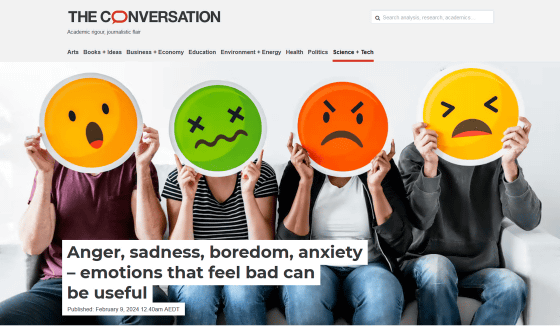Researchers claim that negative emotions such as sadness and anger can be useful for survival and are not necessarily bad.

Negative emotions are always present in our daily lives, such as feeling deeply saddened by breaking up with a loved one, angry after experiencing something unreasonable, or feeling anxious about a big event. Some people may have thought, ``I wish sadness would just go away,'' but
Anger, sadness, boredom, anxiety – emotions that feel bad can be useful
https://theconversation.com/anger-sadness-boredom-anxiety-emotions-that-feel-bad-can-be-useful-217654

Lenzi points out that while people often try to avoid or ignore negative emotions, they can actually be beneficial in certain situations. Therefore, we will explain the benefits of four negative emotions: ``sadness'', ``anger'', ``anxiety'', and ``boredom''.
◆Sadness
Sadness occurs when we fail to achieve a goal or lose something important, and we feel that we can no longer improve our situation. Sadness is associated with what psychologists call a 'deactivation state of doing little,' which does not lead to action or physical arousal, but instead leads to more detailed, analytical thinking. 'It makes you stop and think.'
If you fail at an important event and can't improve the situation, Rench points out that grieving allows you to pause, take a step back, and evaluate what's going on. Sadness leads to more accurate memories , makes people less susceptible to irrelevant information , and allows them to detect lies in others with greater accuracy ; these cognitive changes make people more aware of their past mistakes. Wrench argues that you can learn from them and avoid future mistakes.
On the other hand, sadness may have a different function in situations where we have failed at something but can improve with someone's help. In such situations, emotional expressions such as tears caused by sadness or physiological arousal may attract someone who can help.

◆Anger
Anger occurs when you feel like you are missing a goal or desired outcome, but you can improve the situation by removing obstacles. The disorder may be a wrongdoing by another person, or it may be a computer that crashes many times, but in any case, anger leads to ``
The benefit of focusing on obstacles in preparation for action is that you will be more motivated to overcome obstacles to achieving your goals. Research has also shown that angry people process information and make decisions faster , have better physical performance , and are better able to solve difficult tasks. Another side effect of being angry is that it makes it easier to intimidate others into making concessions in negotiations .
Research shows that angry people are better able to solve difficult tasks than normal people - GIGAZINE

◆Anxiety
The feeling of anxiety occurs when a person perceives a potential threat. This ranges from ``I might fail in an important speech and be embarrassed'' to ``I or my family might be damaged by an earthquake.'' When people feel anxious, they are at risk. Prepare accordingly.
Rench points out that when you feel anxious, you become more alert , and by opening your eyes wider, you can broaden your field of vision and detect danger. Therefore, by feeling anxious and preparing for danger in advance, it will be easier to respond more quickly when trouble occurs and to prevent trouble from occurring.

◆Boring
Although less research has been conducted on boredom than other emotions, it is thought to occur when the current situation does not provoke an emotional response . However, we feel bored when we go to a party expecting to have fun and it turns out to be boring, but we don't feel bored when we just want to relax and do nothing. Just because our emotions aren't aroused doesn't mean we feel bored.
Researchers say one of the benefits of boredom is that it encourages us to make some changes . Boredom motivates people to jump into new situations and change their way of thinking, and is associated with risk-taking and creative thinking. 'Boredom is like an emotional crutch, pushing people to break free from the status quo and to explore and imagine,' says Lenzi.

'People seek happiness, but research is showing that a satisfying and productive life involves a mix of positive and negative emotions . Negative emotions are associated with poor mood. As bad as they are, they can motivate and prepare people for failure, challenge, threat, and exploration. Emotions, whether pleasurable or not, can help guide you toward better outcomes. 'Perhaps understanding that emotions prepare us to deal with different situations may make it easier to experience negative emotions.'
Related Posts:
in Science, Posted by log1h_ik






